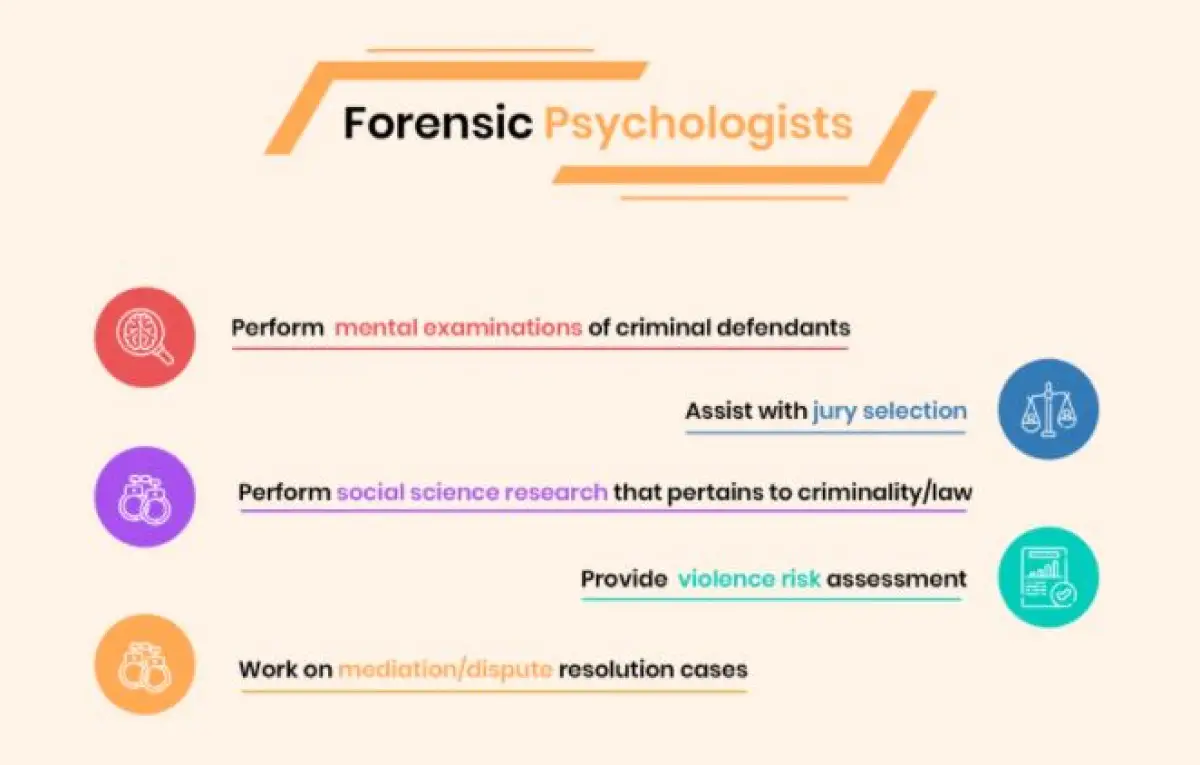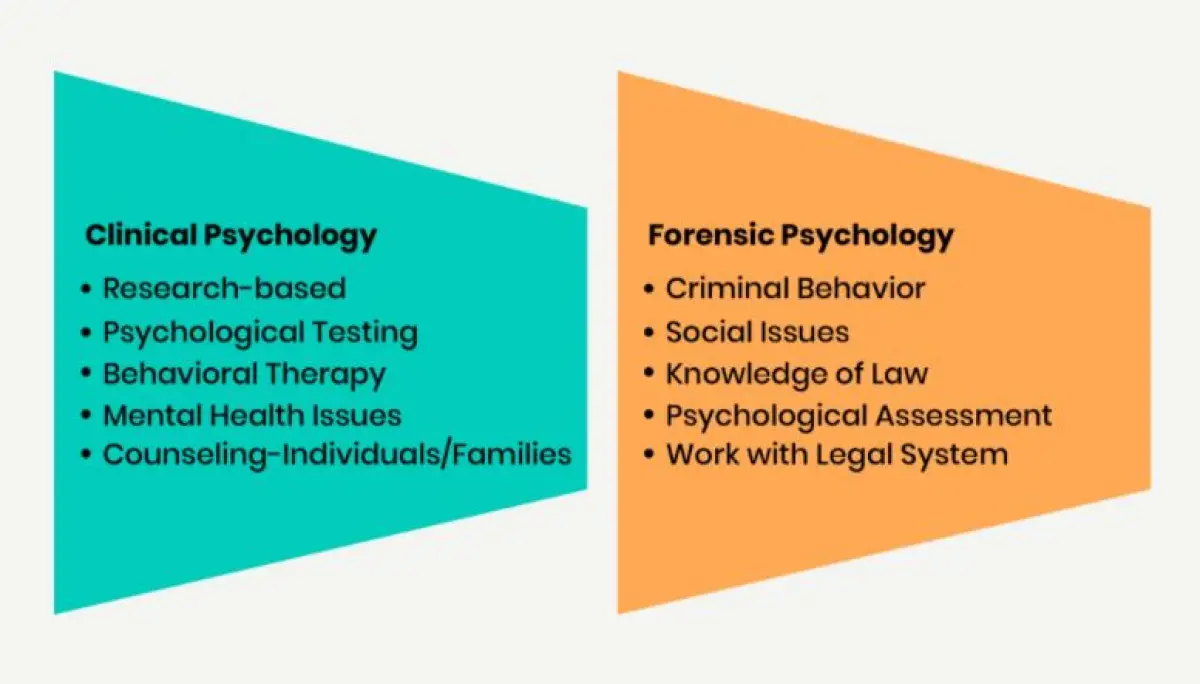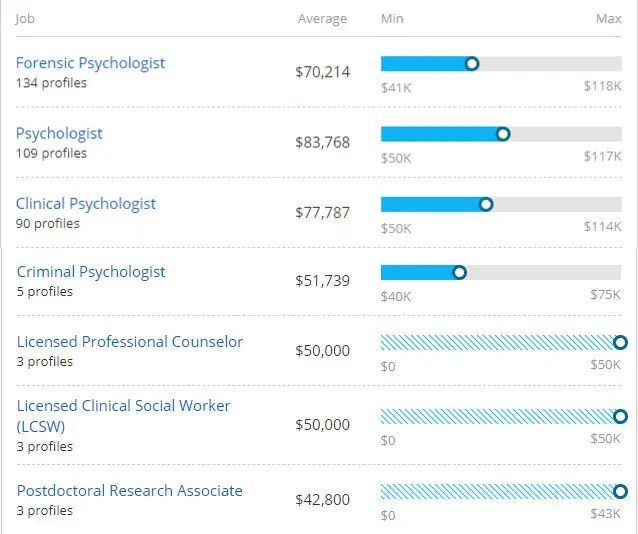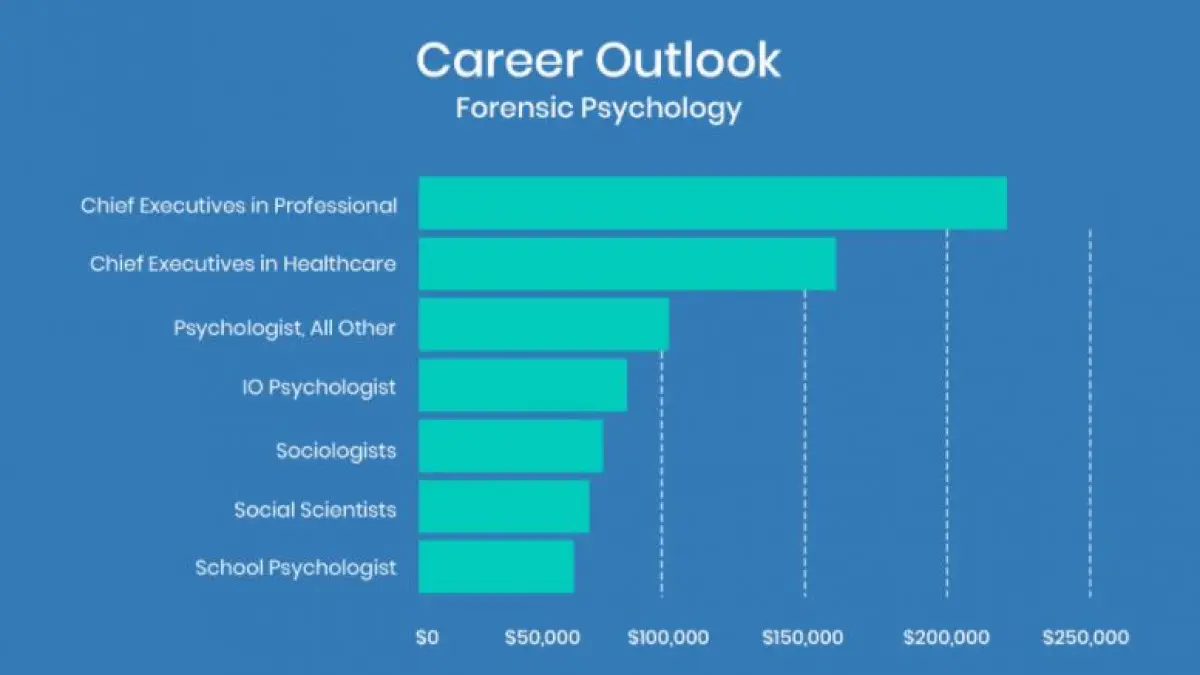How to become a Forensic Psychologist
Learn how to become a forensic psychologist, what kind of degrees and training you need, and what jobs the degrees qualify you for.
What is a forensic psychologist? What do forensic psychologists do? What are the required degrees for forensic psychologists? What are the steps to become a forensic psychologist? This article covers those topics and more.
The word forensic is defined as "the scientific method for investigation of crime.”
The field of forensic psychology combines psychology with a study of the law. People who work as forensic psychologists use psychological expertise in the context of the justice system.
Some psychologists hold specialized degrees in forensic psychology.
Most, however, are licensed psychologists who have gone to college to earn a PhD or PsyD.
These advanced degrees qualify professionals to work in either a civil or legal capacity to understand criminal behavior or assist law enforcement.
Let’s take a look at what psychologists do, the steps to becoming one, and the different degrees a prospective forensic psychologist will need to earn. We’ll also break down the forensic psychologist job outlook.
What does a Forensic Psychologist do ?
Forensic psychologists have a diverse job description with many different tasks.
They may work directly with criminals to evaluate their mental state and determine the likelihood of a future offense. They may also conduct research or work for academic institutions.
Typically, forensic psychologists specialize in gauging the level of threat associated with an offender and delivering treatment to specialized patients.
The assessments, testimonies, and evaluations delivered by forensic psychologists help inform judges and juries and allow criminal justice courts to make educated decisions about sentencing.
So, forensic psychologists play a role in preventing crime and helping at-risk populations rejoin society.
Forensic psychologists who work in the criminal justice courts or civil courts will specialize in assessing competency, issuing second opinions, and delivering treatment like psychotherapy.
These professionals may also work with child witnesses or crime victims and provide assessments for offenders.
Here are a few additional responsibilities of forensic psychologists:
- Examine the mental state of a criminal set to stand trial (including mental stability, competency to stand trial, and more)
- Help facilitate the legal process by providing psychology expertise to various individuals in the legal system
- Direct and deal with child custody, violence risk assessment, and civil law
- Assist with mediation, dispute resolution, and jury selection.
- Evaluate insurance claims
- Offer testimony in civil lawsuits
- Provide psychotherapy services in family courts
- Perform child custody evaluations
- Investigate reports of child abuse
- Conduct visitation risk assessments
11 steps for becoming a forensic psychologist
Let's walk through the 11 steps you’ll likely follow to become a forensic psychologist.
Steps for becoming a Forensic Psychologist
1
Get A High School Diploma Or GED
If you want to become a forensic psychologist, you’ll need a lot of formal education. As such, you’ll need to start with a high school diploma or GED.
You’ll have a bit of a leg-up on your future coursework if you take psychology courses in high school and elect to take plenty of life sciences courses, including chemistry and biology.
2
Complete An Undergraduate Degree
The coursework required to become a forensic psychologist is rigorous, and it starts during the undergraduate years.
To prepare for the career, most would-be forensic psychologists obtain an undergraduate Bachelor of Science degree in psychology.
During undergraduate study, it’s important to keep looking forward and ensure that your undergraduate courses are meeting all the prerequisites for the graduate program you want to enroll in later.
While each program has different prerequisite requirements, commonly required courses include entry-level psychology courses, statistics, and anatomy and physiology.
In some cases, you may be able to take specialized courses like abnormal psychology during your undergrad, which will allow you to pursue internships in your chosen field.
3
Apply For Undergraduate Research Or Internship Positions
Gaining experience is a critical part of the journey to be a forensic psychologist.
As such, you’ll want to apply for relevant research or internship positions during your undergraduate course of study.
If you’re not sure how to go about this, talk with your advisor or professors. They’ll be able to point you toward relevant opportunities and help you decide what is best for you.
4
Pursue A Master’s Degree In Forensic Psychology
After completing an undergraduate degree, students will need to apply to a graduate forensic psychology program. This is where students will be able to specialize in forensic psychology.
Students should look for master’s degree programs accredited by the American Psychological Association (APA) since students need a degree from an accredited university for licensure.
A master’s degree program generally takes two years and will prepare you for your PhD coursework.
5
Get A PhD
Today, most states require practicing, licensed forensic psychologists to have a PhD or a Doctor of Psychology (PsyD) degree.
While therapists may be able to work in the field with a Master of Family Therapy (MFT) degree or similar qualifications, those seeking forensic psychology positions are usually held to higher education standards.
As such, most decide to earn a doctoral degree in criminal behavior.
During your doctoral program, you’ll complete rigorous, highly specialized classes. You’ll also write an original thesis on a research topic of your choice and work with a licensed psychologist or forensic psychologist to gain field hours.
6
Register With The American Board Of Professional Psychology
Students who hope to become certified forensic psychologists will need to register with the American Board of Professional Psychology (ABPP).
Most students choose to register during their PhD programs.
7
Complete The Required Practice Hours
During a PhD program, students will begin practicing under the watchful eye of an experienced licensed psychologist.
While each state has different requirements surrounding the number of supervised hours a new forensic psychologist needs, students must educate themselves about these requirements and meet them accordingly.
8
Pass The Examination For Professional Practice In Psychology (EPPP)
Most states require students to take the EPPP. Students should take this exam as soon as they are eligible in their state, which is typically after they've completed the necessary educational work for their doctoral program.
9
Apply For Professional Licensure
When a student has met all the requirements for a specific state, new psychologists can apply for state licensure with their local board of licensing
10
Apply For Board Certification
To become a board-certified forensic psychologist, you’ll have to apply for certification through the ABPP.
This can be a lengthy process, so it’s wise to begin working toward it as soon as you complete your doctoral degree.
11
Find A Job In Forensic Psychology
Once you’re fully licensed as a forensic psychologist, you’ll be able to find a job without having to worry about working under a supervisor.
While there are many ways to find employment, calling upon your network of other forensic psychologists and professors is an excellent place to start.
Forensic Psychologist Degree Levels
Bachelors
There are several routes you can take to pursue a career in forensic psychology. The first step is to obtain a bachelor’s degree in psychology or a related field.
If you’re not studying psychology, make sure that your undergraduate degree program includes plenty of science and liberal arts courses since this will prepare you for your career.
Some students choose to study criminal justice (these students are typically interested in the criminal psychologist route) with a focus on forensic psychology instead of obtaining a psychology degree.
Any individual who wants to become a forensic psychologist must obtain a bachelor's degree. Regardless of what you intend to do after you've earned your bachelor's, a four-year degree is required.
Here are a few courses bachelor’s degree candidates may take:
Introduction to Psychology
-
Review of psychological standards.
-
Assessment of research information.
-
Knowing present or modern-day theories.
Objectives
Recognition of mental development advancement and human inspiration and Develops understanding processes involved in learning and cognition.
Deviant Behavior
-
Information on the basic deviant behavior.
-
Types of deviant behavior and their origin.
-
Understanding of how to recognize and respond to deviant behavior.
Objectives
Provides familiarity with different types of deviant behavior.
Criminal and Forensic Psychology
-
States mentality of a criminal.
-
Why and how they commit the crime.
-
Getting known to the unethical acts.
Objectives
Provides Knowledge of the psychological basis for criminal acts and Using psychological techniques to understand the criminal mentality and their behavior.
Masters
Since it’s difficult to find master’s degree programs in forensic psychology, many graduate students earn an MS in clinical psychology instead. Typically, those programs offer specialized courses that prepare students to enter the field in their focus area later.
Most master’s degree programs are two years long and designed to prepare candidates to obtain more specialized knowledge during a PhD program.
Here are a few courses master’s degree candidates may take:
Mental Health policy
-
Taught broader overview of criminal laws.
-
Acknowledgment of potential lawful.
-
Understanding of lawful defenses.
Objectives
Provides information about laws that deal with individuals suffering from the mental cause.
Domestic violence
-
Instruct about culprits of family violence.
-
Impact of the violence on the victims.
-
Signs of domestic violence.
Objectives
Learning how domestic violence presents, why abusers act the way they do, and how abuse affects survivors of domestic violence.
Psychological treatment of Adult offenders
- Teaches how to prevent recidivism
- Provides knowledge needed to tailor treatment systems.
- Helps students learn to identify the probability of future recidivism.
Objectives
Utilization of known prevention intervention methods and Examination of intervention and treatment options of criminals.
Doctorate
A doctoral program is useful for any student who is determined to become a psychological
analyst and wants to maximize their potential in the field.
A doctoral program provides the opportunity for specialization, intense study, and original research.
Here are a few courses PhD candidates may take:
Personality analysis
- Teaches various techniques for testing and assessing personalities.
- Teaches students how to deal with various personality traits.
- Teaches the skills needed to administer various personality tests.
Objectives
Comprehension of actuarial versus clinical identity forecasts and Supervise change in personality which occurs through external factors.
Sex offender assessment and treatment
-
Concepts for treating sex offenders.
-
Uses evidence-based treatments.
-
Application of specific legislation.
Objectives
Knowing which theoretical models to utilize while assessing or treating a sex offender.
Clinical research method
-
The fundamental principle of clinical research.
-
Statistical analysis has been covered in course.
-
Building up trial plan design validity.
Objectives
Deciding statistical significance of research information.
Required experience for forensic psychologists
A forensic psychologist’s daily duties are sensitive, important, and complex.
Before an entry-level professional can manage the job successfully, they must complete several thousand hours of supervised training under a more experienced psychologist.
While the rules differ from state to state, most states require at least 4,000 hours or two years of full-time supervised work to apply for a license to practice forensic psychology.
While students can complete some of these hours in an internship setting, at least 2,000 usually must be completed after they earn their doctoral degree.
Again, the specific experience requirements depend on the state you live and practice in. While some states require a total of 3,000 practice hours, others require as many as 6,000.
In addition to being critical for licensure, internships and practicums are also an important part of forensic psychology education and will help practitioners become more skilled and competent in the field.
Forensic Psychologist Salaries:
According to the U.S. Bureau of Labor Statistics’ current Occupational Outlook Handbook, the median national annual salary for psychologists is $77,030.
Actual salaries may vary greatly based on specialization within the field, location, years of experience, and a variety of other factors.
Salaries for forensic psychologists can be excellent, with the BLS reporting that the top 10% of psychologists earn more than $124,520. As with most psychology careers, experience and chosen field of specialty play an enormous factor in salary. The BLS does not publish salary data specifically on forensic psychologists, however, the closest related profession-a traditional psychologist- was reported to be $86,510 in 2010.
Forensic psychologist job growth
According to the U.S. Bureau of Labor Statistics, psychologist employment is expected to grow 14% by 2026, which is much faster than average. This growth will add 32,500 psychologists to the workforce.
This is great news for students who love the field and want to get into an in-demand, fast-paced career.
The reason for the growth is simple: the population is aging, and health care costs are skyrocketing.
Unhealthy lifestyles, personal and family problems, and crime are driving the demand for forensic psychology professionals in schools, law enforcement agencies, social service agencies, and consulting firms.
The need for forensic psychologists in mental health centers is also growing.
Because forensic psychology is such a popular field, it’s also a competitive one. Candidates who have doctoral degrees are preferred candidates and will likely find many opportunities to enter the field.
Meanwhile, candidates who only hold a master’s degree may have a more difficult time finding available positions.
Concentrations for a forensic psychologist
Let’s take a look at three possible concentrations that a forensic psychologist can go into.
Psychological assistant
Psychological assistants are a critical part of the psychological world.
These important professionals work alongside experienced psychologists in settings like correctional facilities and juvenile detention centers. Their roles include conducting clinical interviews, supporting staff members, and completing mental health assessments.
Since this position usually requires only a bachelor’s degree, it’s an excellent option for anyone who doesn't want to put in the time necessary to obtain a PhD.
Researcher
One large component of being a forensic psychologist is research.
In fact, some professionals like this task so much that they decide to focus on it, dedicating their careers to developing new methods of forensic psychology modality or intervention.
These important researchers help shape the future of forensic psychology and move the field of study forward. These researchers typically work in academic or clinical settings.
Clinical forensic psychologist
For forensic psychologists who are also trained in clinical psychology, becoming a clinical forensic psychologist is a great option. These psychologists typically have a doctoral degree in psychology or a Doctor of Psychology degree (PsyD).
Professionals who elect to become clinical forensic psychologists will work with clients who are referred to them by the courts. They will conduct assessments, deliver treatments, and more.
Must-have skills for a forensic psychologist
Forensic psychology is a field that requires specialized skills, including:
1. Clear communication
Forensic psychologists often work in sensitive environments. This includes positions such as jury advisors or victim-advocates. They interact with people all day, every day — often in stressful situations.
As such, it’s important for forensic psychologists to be able to communicate clearly and directly, listen to coworkers and associates, and think critically.
2. Objectivity
Forensic psychologists work in the field of crime and the law.
As such, the daily responsibilities associated with it can be emotionally draining and exhausting. The most successful forensic psychologists are the ones who can step back from the stress and difficulty of the job and be objective about it.
Good forensic psychologists develop the skills to separate themselves from the events they may see or experience and find a way to do the job at hand.
3. Critical thinking
Being a successful forensic psychologist requires a good deal of critical thinking ability.
This is especially true because of the interdisciplinary nature of the field and the fact that it combines a variety of concepts, including counseling, the legal system, and public policy.
4. Attention to detail
One of the primary responsibilities of a forensic psychologist is to make perceptive observations and analyses.
As such, the best forensic psychologists are good at noticing subtle details like body language, facial expressions, and tone of voice. Forensic psychologists who go on to work in corrections or crisis management will find these skills very important.
Becoming a forensic psychologist
Forensic psychology is a fascinating, fast-paced field, and studying it qualifies you to work in a variety of unique settings, including civil and legal positions.
If you’re interested in pursuing a forensic psychology degree, the first thing you have to do is find a forensic psychology program that can teach you the skills you need and provide you with the degrees required to obtain certification.
Fortunately, The College Monk is here to help.
Browse information about online colleges and universities, financial aid packages, and scholarships today to start your journey.
| Minumum Credit Score | Apply in as little as | Variable APR | Fixed APR | ||
|---|---|---|---|---|---|
 | Not Available | 15 minutes or less | 2.95 | 4.74 | View disclosures |
 | 620 | 2 minutes | 5.38%-16.99%1 | 4.43%-16.99%1 | View disclosures |
 | Not Available | 15 minutes | 1.13% - 11.23%¹ (with autopay) | 3.50% - 12.60%¹ (with autopay) | View disclosures |



